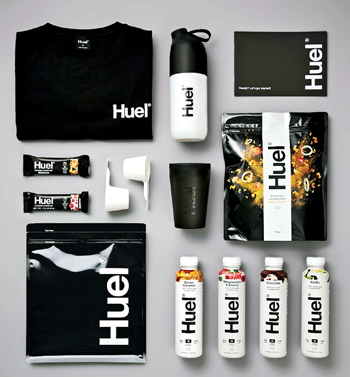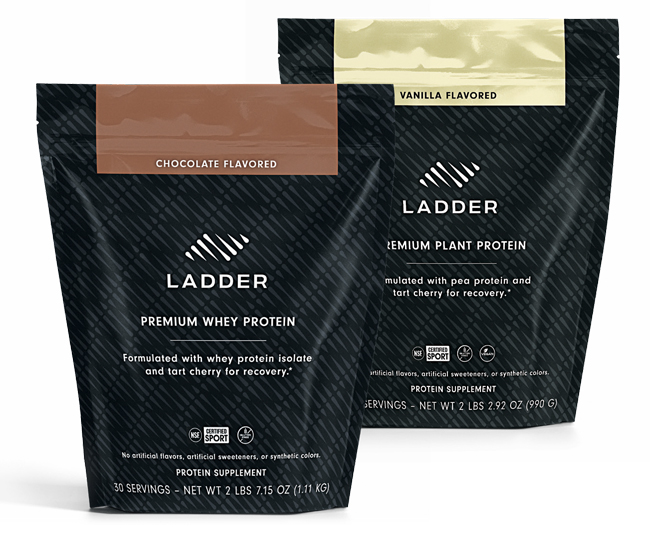Protein Presses On: Why Better-For-You Is Still Pushing Protein Sales Post-Pandemic
When the pandemic hit in Spring 2020 and many food and beverage producers found themselves struggling to keep up with the rush on grocery shelves, protein was one space that found itself in a more precarious situation.
Peter Burns, managing partner at investment firm Sunrise Strategic Partners and the former president and CEO of protein bar maker ONE Brands, told BevNET that despite sales spikes for most categories, certain parts of the protein space, particularly bars and other grab-and-go formats that thrive in the convenience channel, felt the brunt of lockdowns as foot traffic dwindled. Similarly, some at-home formats like powdered meal replacements also reported taking sales hits during the early days of the pandemic; Huel founder Julian Hearn said his business – primarily direct-to-consumer – suffered as shoppers saw less need to drink their meals while stuck indoors. Home cooking — and home cooking hacks — became the hobby du jour.
Two years out, however, the category has rebounded amid a return to normalcy – or some notion of normalcy at least. While commuting is back, Burns noted the supply chain disruptions and rising inflation has begun impacting ecommerce sales, where consumers are potentially facing higher shipping costs and wait times. Meanwhile, as companies try to get their employees back into the office and the gym channel swings back, on-the-go sales are back up and now benefit from heightened awareness around health.
“The latest data is suggesting that the whole order-it-online and have it delivered to your house [model] is slowing down in an inflationary environment with all the fuel charges added,” Burns said. “That is beginning to make an impact. So, you know, the pendulum swings hard and fast both ways, and I think we’re beginning to see a swinging back towards health and wellness activity, going to work, traveling, being on-the-go – and I think that’s going to lead to a normalization in the better-for-you space.”
As consumers have returned to stores, they’re being met with a diversified protein category filled with better-for-you brands in a variety of formats, from plant-based ready-to-drink brands like Koia and Only What You Need (OWYN) to nutrition bars like Perfect Bar that have grown their footprints in conventional retail significantly over the past several years. As well, multi-serve powdered drinks have also seen innovation focusing on flavor, health and function from brands like KOS (which raised $12 million this winter). The expansion of formats alongside taste and functionality has led to a greatly expanded category where consumers are flush with protein options, whether they are on-the-go or at home.
At Huel, which primarily sells direct-to-consumer meal replacement powders in the U.S., Julian Hearn reiterated that taste is key to making better-for-you formats resonate with shoppers whether it’s in powdered or RTD formats (Huel offers both, along with bars). Still, there’s cost sensitivity: for many of his consumers, he said, the pandemic did indeed serve as a wake up call to improve their health, but now inflation is creating a new problem for the business and “price is still key.” The company had to raise prices last year, prompting a wave of subscription customers to cancel their orders. However, the demand for cleaner, healthier and better tasting protein and meal replacement options, he said, hasn’t abated.
“Some people did leave [after the price increase], but interestingly enough a lot of those customers – yes they canceled their subscriptions – but they came back several months later,” Hearn said.
Citing SPINS data, Nick McCoy, managing director of investment bank Whipstitch Capital, told BevNET that retail sales of beverages classified as liquid protein meal replacement were up about 10% in the four-week period ending April 28, led by products like Boost and Premiere, while brands like Pure Protein and Orgain both saw 20% spikes. Data firm IRI reported that products classified under shelf-stable liquid weight control, including RTDs such as Muscle Milk and Fairlife, were up 21.5% in the 52 week period ending February 20, while refrigerated products (including Rebbl, Koia and Bolthouse Farms) were up 42.9%.
For the moment at least, although protein product formats – bars, shakes, powders – do have to compete with one another for share of stomach, the resurgence of the category and rising interest in better-for-you products has also expanded the number of occasions where consumers are seeking out protein solutions in their diets.
“Generally speaking, post-COVID, the data shows that people gravitated towards things that were more nutrient dense,” McCoy said. “Even things like dry beans were way over-indexing. People are reading labels, they are more focused on macros, and people are buying more proteins.”
For startups and entrepreneurial brands, that over-indexing is also now helping them to reach new consumers for whom the pre-pandemic protein set fell short.
As Demographics Expand, Taste is King
Interest in better-for-you products tends to transcend age groups as well. Chris Hunter, co-founder and CEO of Koia, said his brand has seen the most growth over the past year from Gen Xers and younger Baby Boomers in the 45-60 year-old range.
“It suggests that there’s broader adoption around protein, and specifically plant protein,” Hunter said. “As you get even higher in age than that, there’s [health] studies that show your protein consumption should increase, so I think that’s an interesting kind of revelation for us.”
Hunter suggested a few possible reasons for Koia’s adoption by older consumers, key among them simply being the brand’s expanded retail footprint in the conventional channels where older consumers shop, and where Koia’s expanded facings have sometimes taken the place of discontinued legacy brands like Odwalla. Plant-based itself, meanwhile, may not be that important a differentiator to this shopper, whereas Koia’s strong taste profile connects with trial consumers and drives repeat sales. Many older consumers, he suggested, could be ingrained in an “I eat what I like to eat” mentality and less likely to sacrifice taste for health – prompting the company to pitch its products as a “healthy milkshake” that can win on-shelf by backing up its flavor with better-for-you bona fides.
“We really focus on ‘delicious’ first and foremost,” Hunter said. “If we’re in a Whole Foods, or any natural retailer, we’re talking about plant-based, we’re talking about non-GMO, we’re talking about low sugar, and things like that. But when I went into a 7-Eleven, as an example, I mentioned that this is a plant-based protein beverage to the shopper and he immediately said ‘I’m not interested in even tasting it.’ And I said, ‘No, no, actually, this is a healthy milkshake.’ That’s the way [to sell it] if it’s healthy, because all I need them to do is taste it and they go ‘Oh my god, that’s a healthy milkshake.’”
McCoy noted that Koia has significantly increased its business in the conventional channel over the past two years, with velocities nearly 13 times their rates in the natural channel.
Outside of RTD, powdered protein drink makers are also finding that while health is a hook, taste remains a necessity.
One brand focusing on a more niche set of consumers is Ladder. Founded in 2018, Ladder was developed by NBA All-Star LeBron James, who was seeking a more complete nutritional profile from his protein supplements that could match the needs of a professional athlete. James worked with his trainer Mike Mancias to restructure his nutrition and workout regimen and assembled a team of experts to formulate a line of clean performance products. He also consulted with actor and former California Governor Arnold Schwarzenegger about his knowledge of the sports nutrition industry to help launch the brand.
The company now produces a full portfolio of powdered nutritional supplements, including plant-based shakes, pre-workout, whey protein, pea-derived plant protein, superfood greens and hydration. The powders are sold online direct-to-consumer and are also sold to 45 professional sports teams and are NSF certified for athletes.
Speaking with BevNET, Christina Cartwright, SVP Nutrition for Ladder owner Beachbody, said the brand has found an unserviced segment of consumers in pro athletes who, despite the myriad of supplements available on the market, can still struggle to find a complete nutrition product line under a single umbrella. Significantly, the brand has also invested in shoring up its flavors; its pre-workout is strawberry lemonade flavored while the plant and whey proteins come in chocolate and vanilla. The strong taste has been key to securing contracts with sports teams and driving word of mouth among the select target demographic, she said.
“It’s about drinkability and the ability for them to consume it and to be open and willing to consume it,” Cartwright said. “They’re not feeling like they have to [drink it].”
While that demographic will continue to be the core focus for the company, Ladder has also begun servicing an everyday consumer as well through its protein-rich nutrition shakes. Cartwright said the product was developed to meet the influx of consumers coming into the powdered protein category today who are seeking out more protein. Beyond taste, the powdered format also offers convenience.
“That consumer tends to be more female and there’s kind of two different groups,” Cartwright said. “One that is looking to actually lose weight, and this is a good solution for them as either a snack or a meal replacement when they mix it with other things. The flip side to that is a very busy, active female who likely has children in the home, so it’s serving as kind of a quick meal for herself. But also she’s more likely to be active in general, whether it means she works out on a daily basis, or she’s doing things with the kids. She’s looking at this as another source of protein.”
Back at Sunrise Management Partners, co-founder and managing partner Stephen Hughes noted that brands have to be trend-sensitive as well: the keto diet has “echoed” across the protein sector, impacting everything from ready-to-drinks to breakfast products like pancakes (Sunrise is an investor in protein-rich brand Kodiak Cakes). Hughes’ partner, Burns, added that going forward and meeting the changing, specified needs of consumers will continue to be a necessity for protein-focused brands.
“I think what you’re going to see with, whether it’s bars, whether it’s powders or shakes, you’ve got the keto aspect,” Burns said. “You’ve got additives like MCT, greens, different sweeteners – all those different things are going to be in the mix as companies try to differentiate themselves from each other. And I think you’ve seen a lot of differentiation between, ‘I’m going to deliver products specifically for women or specifically for men,’ folks have taken that angle a little bit, and at some point, given the changing world we live in [the question is] do things like CBD come into play at some point?”


Receive your free magazine!
Join thousands of other food and beverage professionals who utilize BevNET Magazine to stay up-to-date on current trends and news within the food and beverage world.
Receive your free copy of the magazine 6x per year in digital or print and utilize insights on consumer behavior, brand growth, category volume, and trend forecasting.
Subscribe

